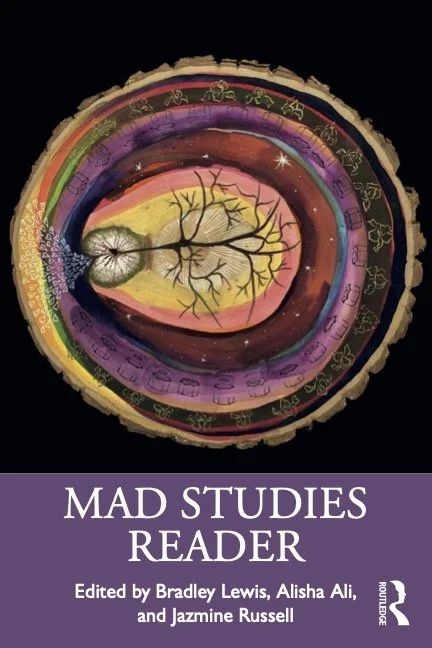Books & Articles
I write from my lived and professional experiences as well as academic research on the topics of mental health, psychosis/ schizophrenia, personal and intergenerational trauma, philosophy of psychiatry, mad studies, neurophilosophy, critical psychology, the mind-body problem in health, integrated medicine, chronic illness, disability justice, spiritual emergence, and grassroots mental health activism.
Mad Studies Reader: Interdisciplinary Innovations in Mental Health
Edited by Dr. Bradley Lewis, Dr. Alisha Ali & Jazmine Russell -Routledge Press, September 2024
The last few years have brought increased writings from activists, artists, scholars, and concerned clinicians that cast a critical and constructive eye on psychiatry, mental health care, and the cultural relations of mental difference. With particular focus on accounts of lived experience and readings that cover issues of epistemic and social injustice in mental health discourse, the Mad Studies Reader brings together voices that advance anti-sanist approaches to scholarship, practice, art, and activism in this realm.
Beyond offering a theoretical and historical overview of mad studies, the Reader draws on the perspectives, voices, and experiences of artists, mad pride activists, humanities and social science scholars, and critical clinicians to explore the complexity of mental life and mental difference. Voices from these groups confront and challenge standard approaches to mental difference. They advance new structures of meaning and practice that are inclusive of those who have been systematically subjugated and promote anti-sanist approaches to counter inequalities, prejudices, and discrimination. Confronting modes of psychological oppression and the power of a few to interpret and define difference for so many, the Mad Studies Reader asks the critical question of how these approaches may be reconsidered, resisted, and reclaimed.
This collection will be of interest to mental health clinicians; students and scholars of the arts, humanities and social sciences; and anyone who has been affected by mental difference, directly or indirectly, who is curious to explore new perspectives.
How Delusions Can Uncover Sources of Harm and Pathology:
The Epistemic Value of Interoceptive & Unconscious Information
Forthcoming in Philosophy and the Mind Sciences Journal (Lisa Bortolotti’s Book Symposium), October, 2024
Prevailing views of delusional beliefs frame them as pathological and harmful, leaving little room for understanding why delusions may emerge. Lisa Bortolotti’s book, “Why Delusions Matter,” offers a more compassionate perspective on delusions, framing them as adaptive and meaningful responses to crises. However the understanding of delusions as adaptive coping strategies is still limiting insofar as it doesn’t acknowledge that some delusions are adaptive precisely because they can reveal information about the sources of harm and pathology. Some delusions, especially those that arise in the context of traumatic experiences and psychosis, can be better understood as the body’s attempt to alert us to sources of harm. Drawing from the neuroscience literature and the author’s personal encounters with psychosis and trauma, this article contends that some delusions can help us access interoceptive information from the body, uncovering sources of pathology, as well as previously unconscious information about harmful traumatic experiences. Ultimately, taking an epistemic justice lens to delusions, uplifts their value in revealing very real embodied experiences of the individual expressing them.
Who Do We Leave Behind When We Ignore the Body? Why Critical Neuroscientists and Mad Activists Must Work Together
Published in Mad In America, May 2, 2024
The mind-body problem in psychiatry has very real implications for those who suffer at the intersection of mental health and chronic illness, which is a much larger group than one might expect. We currently face an important opportunity to develop more holistic and generative frameworks for understanding the complex interplay between what we consider mental, biological, and societal. What if we can draw on critical neuroscience research to open up new pathways for those suffering?
Pidgin English: Ancestral Retention & The Mechanisms of Intergenerational Trauma
Published in Anodyne Magazine Vol 2., March 2024
Recollecting pieces of her grandfather’s past, Russell explores the psychological and structural mechanisms of intergenerational trauma transmission. As a mixed-race German Filipina woman raised by two first generation immigrants, she redefines notions of impostor syndrome, self-doubt, and shame as inherited trauma that can reveal important information. She argues that in order to feel a sense of belonging and shared history, we must become aware of the ways in which our ancestors live through us.
Rethinking Crisis, Rethinking Mental Health Education
Medium.com, October 2018
Allowing people with lived experience to speak for themselves and acknowledging the multiple contexts in which our mental health exists is the driving force behind IDHA’s upcoming course series: Experience Transforms Practice…
Developing a Common Vocabulary: Questions of Purpose and Priority
Journal Of Humanistic Psychology , August 2018
The “Standards and Guidelines for the Development of Diagnostic Nomenclatures and Alternatives” (by Kamens et al.) provide much-needed considerations for any agency or group undertaking the project of creating diagnostic/descriptive categories, including the vital assertion that those with lived experience of mental distress must be a valued part of the process. However, to fully take into account the unique needs of those with lived experience, we must also question the very assumption that diagnostic and descriptive systems are necessary to promote well-being. This article addresses the current tension in diagnostic priorities and explores the benefits of encouraging personal expressions of mental distress in the context of activism and peer support.


















